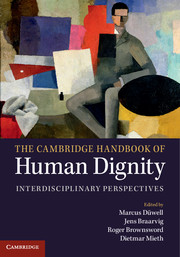Book contents
- Frontmatter
- Contents
- List of contributors
- Foreword
- Why a handbook on human dignity?
- Acknowledgments
- 1 Human dignity from a legal perspective
- 2 Human dignity: concepts, discussions, philosophical perspectives
- Part I Origins of the concept in European history
- Part II Beyond the scope of the European tradition
- Part III Systematic conceptualization
- 19 Social and cultural presuppositions for the use of the concept of human dignity
- 20 Is human dignity the ground of human rights?
- 21 Human dignity: can a historical foundation alone suffice? From Joas’ affirmative genealogy to Kierkegaard's leap of faith
- 22 Kantian perspectives on the rational basis of human dignity
- 23 Kantian dignity: a critique
- 24 Human dignity and human rights in Alan Gewirth's moral philosophy
- 25 Human dignity in the capability approach
- 26 Human dignity in Catholic thought
- 27 Jacques Maritain's personalist conception of human dignity
- 28 Scheler and human dignity
- 29 Dignity and the Other: dignity and the phenomenological tradition
- 30 Dignity, fragility, singularity in Paul Ricœur's ethics
- 31 Human dignity as universal nobility
- 32 Dignity in the ubuntu tradition
- 33 Posthuman dignity
- 34 Dignity as the right to have rights: human dignity in Hannah Arendt
- 35 Individual and collective dignity
- Part IV Legal implementation
- Part V Conflicts and violence
- Part VI Contexts of justice
- Part VII Biology and bioethics
- Appendix 1 Further reading
- Appendix 2 Universal Declaration of Human Rights
- Index
- References
21 - Human dignity: can a historical foundation alone suffice? From Joas’ affirmative genealogy to Kierkegaard's leap of faith
from Part III - Systematic conceptualization
Published online by Cambridge University Press: 05 March 2015
- Frontmatter
- Contents
- List of contributors
- Foreword
- Why a handbook on human dignity?
- Acknowledgments
- 1 Human dignity from a legal perspective
- 2 Human dignity: concepts, discussions, philosophical perspectives
- Part I Origins of the concept in European history
- Part II Beyond the scope of the European tradition
- Part III Systematic conceptualization
- 19 Social and cultural presuppositions for the use of the concept of human dignity
- 20 Is human dignity the ground of human rights?
- 21 Human dignity: can a historical foundation alone suffice? From Joas’ affirmative genealogy to Kierkegaard's leap of faith
- 22 Kantian perspectives on the rational basis of human dignity
- 23 Kantian dignity: a critique
- 24 Human dignity and human rights in Alan Gewirth's moral philosophy
- 25 Human dignity in the capability approach
- 26 Human dignity in Catholic thought
- 27 Jacques Maritain's personalist conception of human dignity
- 28 Scheler and human dignity
- 29 Dignity and the Other: dignity and the phenomenological tradition
- 30 Dignity, fragility, singularity in Paul Ricœur's ethics
- 31 Human dignity as universal nobility
- 32 Dignity in the ubuntu tradition
- 33 Posthuman dignity
- 34 Dignity as the right to have rights: human dignity in Hannah Arendt
- 35 Individual and collective dignity
- Part IV Legal implementation
- Part V Conflicts and violence
- Part VI Contexts of justice
- Part VII Biology and bioethics
- Appendix 1 Further reading
- Appendix 2 Universal Declaration of Human Rights
- Index
- References
Summary
Among the manifold attempts to provide the idea of human dignity and the related human rights practice with a historical foundation, Hans Joas’ ‘affirmative genealogy’ is surely one of the most innovative and striking methodological approaches being presented during the last few years. If one wishes to analyze the advantages and disadvantages of this foundational type in general, Joas’ account undoubtedly offers an excellent example of how to do this. For the purpose of such an examination, however, it is necessary first to examine the underlying argument motivating Joas’ methodological decisions.
For Joas, somewhere in the eighteenth century a major cultural shift took place whereby the human person progressively became a sacred object. The outcome of this process was the emergence of an ethical value that Joas designates as the sacredness of the person. Different codifications of human rights and the establishment of a related human rights practice can be seen as a significant consequence of this value appearance. Though Joas constantly emphasizes the historical contingency of value emergences, he is well aware that values do not appear from nowhere but have a specific history or, as he puts it, a genealogy. In case of the sacredness of the person, it was the traumatic experience of violence, oppression and misrecognition that led to the emergence and experience of this value. Nowadays, however, the sacredness of the person seems to be endangered. ‘Even in the core area of the West’, Joas complains, ‘there can be no talk of a secure consolidation of the sacredness of the person’ (Joas 2011: 104). Likewise the meaning of this value threatens to become abstract, dogmatic or purely conventional so that it is in danger of being deprived of its affective power and the related human rights practice will lose its motivational basis. For Joas, it is exactly this endangering and threatening situation that generates the need for an affirmative genealogy. ‘Affirmative genealogy’ can thus be delineated as a method to revitalize original value experiences by means of a historical or narrative iteration of their genealogy. The revitalization, in turn, is necessary to motivate, encourage or even to extend the human rights practice. ‘Value judgements’, Joas says, ‘point at stories. We make plausible – and in doing that we also defend – our value commitments by narrating how we have arrived at them and what will happen when they are offended’ (ibid.: 259).
- Type
- Chapter
- Information
- The Cambridge Handbook of Human DignityInterdisciplinary Perspectives, pp. 208 - 214Publisher: Cambridge University PressPrint publication year: 2014
References
- 1
- Cited by



